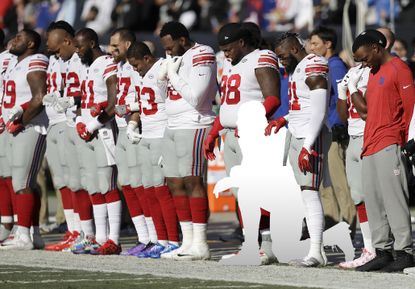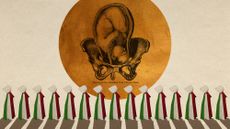There are no winners in the NFL's new national anthem rules
We're all losers


The NFL has in recent years mishandled every major controversy to befall professional football, from disciplining players for off-field domestic violence to imposing consistent penalties for on-field infractions.
The debate over players kneeling in protest during the national anthem is no different.
Team owners sought to rectify the situation Wednesday with new rules forbidding anthem protests on the sidelines, while letting players remain in the locker room if they do not wish to stand and leaving franchises with wide latitude to set their own workplace policies on the issue (the league would fine teams rather than individual players if someone takes a knee, though many believe the teams would likely pass fines along to players).
Subscribe to The Week
Escape your echo chamber. Get the facts behind the news, plus analysis from multiple perspectives.

Sign up for The Week's Free Newsletters
From our morning news briefing to a weekly Good News Newsletter, get the best of The Week delivered directly to your inbox.
From our morning news briefing to a weekly Good News Newsletter, get the best of The Week delivered directly to your inbox.
Meant as a compromise, players are already speaking out against the new policy, as many believe protests are largely ineffective when conducted out of sight. Still, sports reporters are sure to take attendance during the anthem to see who might be inside the locker room. And if the teams really are the ones paying the fines, it's possible players will defy the rules and protest on the field.
But not every player will have the confidence in his job security to break the rules. NFL teams are notoriously ruthless in cutting players, and few owners will want to court controversy over anything but irreplaceable star players.
The rule also seems likely to give NFL Commissioner Roger Goodell new arbitrary disciplinary powers, something professional football hardly needs.
But it is the substance of the debate itself, rather than the NFL's hamfisted attempts to wriggle out of it, that is most troubling. In a country that is becoming increasingly diverse in almost every way, putting national pride and racial justice in opposition to one another is a prescription for disaster.
This is especially true given the reality that our national symbols and history can have more complicated meaning for communities of color and descendants of slaves. It is also true that the method of the protest could scarcely be designed to be more offensive to the disproportionately white and conservative fanbase who most need to be reached about police brutality and issues with disparate impact on minorities.
President Trump had an opportunity to hone a civic American nationalism in which regardless of all the other smaller group identities we have, we identify as Americans first. While he has occasionally said and done the right things on this front, far too often he prefers to score cheap points with his base — not least on the anthem protests — and divide people along political, cultural and, yes, racial lines. He did this again in his new Fox & Friends interview, suggesting that players who don't stand for the anthem "shouldn't be in the country."
It is especially sad to see football — a game that has brought Americans together across racial boundaries in the stands and on the field, one that has produced enduring interracial friendships and promoted national unity — take on the divisive characteristics of politics. Sports have been a source of common ground in a country where such ground has become hard to find.
The flag being honored when the national anthem plays is the flag of the black players concerned about police shootings. The civil liberties these protests are at their best intended to defend are enshrined in the Constitution that protects the white person in a red "Make America Great Again" cap.
The men and women who have fought and died under that flag, despite the imperfections of the country it symbolizes, come from all races and creeds. They also fought and died for the right of the people at home of all races and creeds to protest. And those who fought and survived deserved to come home to see their rights vindicated and respected.
None of this is easy in a country with our history or present divisions. It is understandable why it is hard for those who kneel to empathize with those who find their form of protest offensive, just as it is difficult for those angered by the protests to find empathy for those who engage in them.
The alternative, however, is too ugly to contemplate.
Create an account with the same email registered to your subscription to unlock access.
Sign up for Today's Best Articles in your inbox
A free daily email with the biggest news stories of the day – and the best features from TheWeek.com
W. James Antle III is the politics editor of the Washington Examiner, the former editor of The American Conservative, and author of Devouring Freedom: Can Big Government Ever Be Stopped?.
-
 Italian senate passes law allowing anti-abortion activists into clinics
Italian senate passes law allowing anti-abortion activists into clinicsUnder The Radar Giorgia Meloni scores a political 'victory' but will it make much difference in practice?
By Chas Newkey-Burden, The Week UK Published
-
 Magazine interactive crossword - May 3, 2024
Magazine interactive crossword - May 3, 2024Puzzles and Quizzes Issue - May 3, 2024
By The Week US Published
-
 Magazine solutions - May 3, 2024
Magazine solutions - May 3, 2024Puzzles and Quizzes Issue - May 3, 2024
By The Week US Published